Listen and I’ll tell you what this site is about. You have taken the first steps in improving your listening abilities. Now, if your willing, let’s work a little more. The goal is for you to understand Gods will for your life. Spiritual maturity comes with knowledge. Knowledge comes from study. Many believers worship regularly, subsequently, they are a part of the ongoing struggles of light over dark, life over death and good over evil. Namely,all this takes place on earth. This is all good news, yet, there could be more. Lets go over the Lords prayer:
The Lord’s Prayer: Matthew 6:9-13 Version (KJV)
Our Father which art in heaven, Hallowed be thy name. Thy kingdom come, Thy will be done in earth, as it is in heaven. Give us this day our daily bread. And forgive us our debts, as we forgive our debtors. And lead us not into temptation, but deliver us from evil: For thine is the kingdom, and the power, and the glory, for ever. Amen.
The Lord’s Prayer: Luke 11:2-4 Version (KJV)
Our Father which art in heaven, Hallowed be thy name. Thy kingdom come. Thy will be done, as in heaven, so in earth. Give us day by day our daily bread. And forgive us our sins; for we also forgive every one that is indebted to us. And lead us not into temptation; but deliver us from evil.
Please notice this. Generally, the stated plan in both Mathew and Luke says, the Kingdom comes to earth as it is in heaven. All of God’s believers have a part in this plan. Some believers know their part. Yet, other believers are learning their part. The key to finding Gods will for your life is prayer, education and service.
Prayer is the first priority. Typically, when starting your education. We know what you need to learn. Hence, while looking at choices of books to read or courses to take, ask for our help, We will be there to help you choose, if you will learn to listen.
WRITINGS BY; BEN H. SWETT
The following is one of many writings published by retired Colonell Ben Swett. Ben posted much material on the internet over a 50& year period. I (Ralph) never met Ben (he passed July 2019). By the same token, after reading many of his writings, it’s as if I know him. Ben gave us his permission to copy and re-post his writings . We would like you to consider the education he offers here about prayer.
PRAYER AS A FORM OF TWO-WAY COMMUNICATION
Ben H. Swett
26 February 1970
updated annually through
10 March 1990
Prayer is defined as “an attempt to communicate with God”. Consequently, what we know about other forms of communication could help to clarify our understanding of prayer.
Any form of communication requires a transmitter and a receiver. Transmission without reception is not communication.
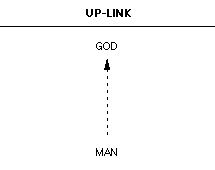
Prayer is normally considered to be communication from man to God. We transmit and God receives–but this kind of one-way communication has some inherent problems:
- There isn’t much we can tell God that He doesn’t already know, and there is no one we can ask Him to care for that He doesn’t already love, so one-way prayer is not very useful, in and of itself.
- We can’t know whether our prayers are heard unless we receive a reply. That’s why many people get discouraged with prayer: they transmit in the blind and then wonder if anyone heard them, or if anyone is even listening.
God to man
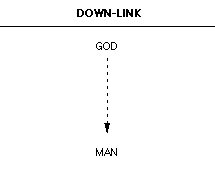
One-way communication from God to man is called inspiration or revelation or “the word of God.” God transmits and man receives. The Bible is full of examples:
- Adam and Eve listened to God–until they decided it was a sin to be naked and tried to hide themselves from Him.
- Noah would have gotten his feet wet if he hadn’t been listening.
- Abraham would have killed his son Isaac if he had not heard the word of God in that last moment when he had his knife raised.
- Jacob wrestled all night with an angel–and received his new name: “Israel.”
- God spoke with Moses “face to face, as a man speaks with his friend.”
- Except for the matter of Bathsheba, David sought for, received, and obeyed guidance from God all of his life.
- All of the prophets declared “The word of God came to me, saying … “
- Jesus said “The Father himself has given me instruction, what to say … “
- And Jesus continued to guide his disciples, after his resurrection.
Gods will for your life might or might not be exactly as the above examples, yet he surely has a plan.
Most examples of prayer in the Bible are not merely communication from man to God, or from God to man. They are examples of two-way communication.
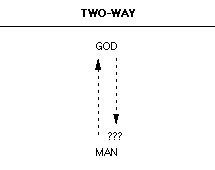
Any two-way communication requires four basic elements–two transmitters and two receivers–arranged as a pair of communication links.
We transmit and God receives; and God transmits, but we don’t listen very well. That’s the problem.
However…
Any good communication system has built-in redundancy and alternate modes of operation. In this case, some of the receiver-transmitter units are incarnate (in physical bodies) and some are discarnate (not in physical bodies).
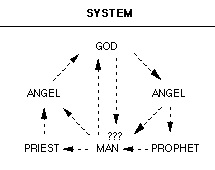
When men want to communicate with God but don’t know how, they may go to those who can (or say they can). They may communicate with God through His angels, but they usually go to other human beings.
- Historically, the role of a priest is to represent other people before God. He hears their concerns and relays their messages to God. In ancient times, the priests were in charge of offering up their own and other people’s sacrifices.
- The role of a prophet is to receive God’s messages and relay them to others. Much of what we call “scripture” is the written form of prophecy–a record of messages from God to man. (Prophecy does not necessarily mean prediction.)
- Angels assist both ways.
- Jesus performs all of these functions: he is son of man and son of God, leader of angels, high priest and prophet forever.
With this kind of help, the communication system works even though it does have some inoperative down-link receivers.
Any communication system has the problem of false or spurious signals, and this one is no exception. Again, the problem is in our ability to receive.
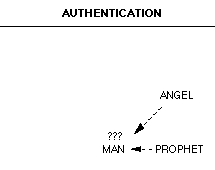
Angel means “messenger” and prophet means “spokesman” but neither of these terms necessarily refers to an angel or prophet of God. A fallen angel or a false prophet can claim to speak for God when it is not so, and this world is full of writings that claim to be the will or the way of God.
Therefore, the critical questions are always the same: “Whose messenger is this? Whose spokesman? Where did this idea come from? Who speaks for God and who does not?”
A radio receiver usually has a dial, or some kind of indicator, to show where it is tuned and which way is up (and down) the electromagnetic spectrum. Here is an analogy …
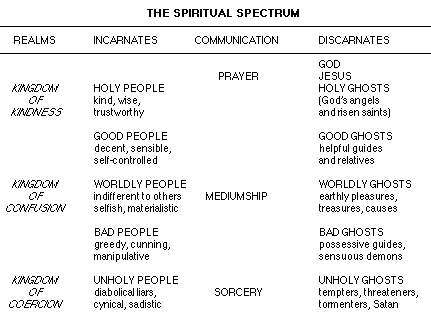
Note that the key to this spectrum is attitude toward others.
Higher beings are more loving; lower beings are less loving.
God is the Author of love and truth. Jesus loves all; Satan loves none. All other entities vary by degree. That is the fundamental difference, whether the entities involved are incarnate (in a physical body) or discarnate (not in a physical body).
The internal frequency of a radio receiver determines which transmitters it will pick up, and the directional antenna of a television set further aligns its reception to a particular station. The analogy is suitable–the difference between prayer, mediumship and sorcery is in the tuning of the receiver.
To receive messages from God, tune yourself up toward the top of this spectrum. Moment by moment, whether your real purpose is to give or to get, to serve or be served, is the pivot-point on which your spiritual direction turns upward or down.
To decide which level of the spiritual spectrum a message is coming from, look for the fruit of the Holy Spirit. Gods will for your life will come from the Holy Spirit.
22 But the fruit of the Spirit is love, joy, peace, longsuffering, gentleness, goodness, faith,
23 Meekness, temperance: against such there is no law (Galatians 5:22-23).
(Matthew 7:15-20).
15 Beware of false prophets, which come to you in sheep’s clothing, but inwardly they are ravening wolves.
16 Ye shall know them by their fruits. Do men gather grapes of thorns, or figs of thistles?
17 Even so every good tree bringeth forth good fruit; but a corrupt tree bringeth forth evil fruit.
18 A good tree cannot bring forth evil fruit, neither can a corrupt tree bring forth good fruit.
19 Every tree that bringeth not forth good fruit is hewn down, and cast into the fire.
20 Wherefore by their fruits ye shall know them.
Also note what happens when people die: holy people become holy ghosts; good people become good ghosts; etc.. This is automatic.
Use the checklist to help with prayer
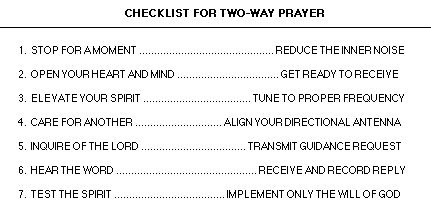
Prayer is communication, communication will help you find Gods will for your life.
1. Stop for a moment: Set aside your problems. Let the tension go. For the moment, only dwell on calm and peaceful things. Don’t worry about formalities. Don’t try to concentrate. Just get quiet. Reduce the inner noise so you can hear.
2. Open your heart and mind: Let go of resentment. Confess your faults–and your fears. Get it off your chest so you can rise. Admit the fact that some of your ideas may be false. Dare to care. Dare to face the truth. Get ready to receive.
3. Elevate your spirit: Remember a specific example of something good or true or beautiful or holy, and see the hand of God at work in it. Continue to recall examples. Notice the upward flow of reverent joy within you–but don’t get addicted to it. Just tune your spirit up toward the frequency of God’s transmitter.
4. Care for another: Set aside your self-interest and focus good will on a specific person. Care for that person as God cares: without any other motivation, choose to desire for him or her the truest of blessings. This aligns your free will with the will of God–and thus automatically aligns your directional antenna.
5. Then pray: “Father, how can we help this person?” Don’t assume that you know the answer. Do not invoke less-than-holy discarnates. Inquire of the Lord.
6. And then listen: Stop thinking for a moment and notice what pops into your mind. A light reverie is best; full trance is neither necessary nor desirable. If you receive no reply, just go about your business and try again later. A message may come in a variety of forms, but in any case:
7. Test the spirit: Look for the implied purpose of the message. Ask yourself “Where is this coming from? Where will it lead?” Use your experience with good folks and bad folks. Cross-check with the New Testament. Ask a trusted friend to help. Once you are satisfied that a message is coming from God, get off your duff and implement His guidance. Just don’t forget to check in once in awhile to see if He has any more messages for you.
Voices of God
Gods purpose for your life, usually comes as inspiration, revelation or any of the forms, but you will recognize it clearly.
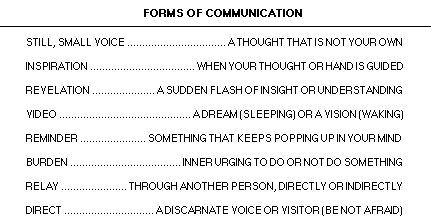
All of these can be forms of discarnate communication. The only real difference between them is technical, like the difference between telegraph, telephone, radio, television, etc. Therefore, it doesn’t matter which form of communication is used.
CAVEATS
- Do not assume that the form of communication indicates whether or not a message is from God. The implied purpose of the message is important, but the form is not.
- Revelation in nature or history is a matter of interpretation. Anyone can see anything as a “sign” of anything else–so this kind of “revelation” is more truly a product of the interpreter than it is of the Creator.
- Casting lots (drawing straws, rolling dice, flipping a coin, etc.) can be seen as an appeal to the impartial justice of the laws of nature, and nature’s God, if the intent is to reach an impartial decision. However, divination by casting lots is not a good way to seek the will of God in any other situation, because there is no way to be sure that God miraculously controlled the outcome.
- Don’t assume that your prayers were answered just because you got what you wanted, and don’t assume that God is mad at you just because you didn’t get what you wanted.
- It is impossible to prove that you had any kind of subjective experience, and it is futile to claim divine guidance in the face of opposition (John 8:12-59).
Expect opposition
- Even among friends, such claims may be seen as implying “I’m better than you.” Therefore, it is seldom wise to say “This came from God” or “Thus sayeth the Lord.” Let the observable evidence of your words and deeds testify to the spirit that motivates you, as Jesus did (Luke 7:18-23) .
18 And the disciples of John shewed him of all these things.
19 And John calling unto him two of his disciples sent them to Jesus, saying, Art thou he that should come? or look we for another?
20 When the men were come unto him, they said, John Baptist hath sent us unto thee, saying, Art thou he that should come? or look we for another?
21 And in that same hour he cured many of their infirmities and plagues, and of evil spirits; and unto many that were blind he gave sight.
22 Then Jesus answering said unto them, Go your way, and tell John what things ye have seen and heard; how that the blind see, the lame walk, the lepers are cleansed, the deaf hear, the dead are raised, to the poor the gospel is preached.
23 And blessed is he, whosoever shall not be offended in me.
COMMUNICATION WITH DISCARNATES
Objections:
- Occult: forbidden, an abomination to God punishable by death (Deut 18:9-22).
9 When thou art come into the land which the Lord thy God giveth thee, thou shalt not learn to do after the abominations of those nations.
10 There shall not be found among you any one that maketh his son or his daughter to pass through the fire, or that useth divination, or an observer of times, or an enchanter, or a witch.
11 Or a charmer, or a consulter with familiar spirits, or a wizard, or a necromancer.
12 For all that do these things are an abomination unto the Lord: and because of these abominations the Lord thy God doth drive them out from before thee.
13 Thou shalt be perfect with the Lord thy God.
14 For these nations, which thou shalt possess, hearkened unto observers of times, and unto diviners: but as for thee, the Lord thy God hath not suffered thee so to do.
15 The Lord thy God will raise up unto thee a Prophet from the midst of thee, of thy brethren, like unto me; unto him ye shall hearken;
16 According to all that thou desiredst of the Lord thy God in Horeb in the day of the assembly, saying, Let me not hear again the voice of the Lord my God, neither let me see this great fire any more, that I die not.
17 And the Lord said unto me, They have well spoken that which they have spoken.
18 I will raise them up a Prophet from among their brethren, like unto thee, and will put my words in his mouth; and he shall speak unto them all that I shall command him.
19 And it shall come to pass, that whosoever will not hearken unto my words which he shall speak in my name, I will require it of him.
20 But the prophet, which shall presume to speak a word in my name, which I have not commanded him to speak, or that shall speak in the name of other gods, even that prophet shall die.
21 And if thou say in thine heart, How shall we know the word which the Lord hath not spoken?
22 When a prophet speaketh in the name of the Lord, if the thing follow not, nor come to pass, that is the thing which the Lord hath not spoken, but the prophet hath spoken it presumptuously: thou shalt not be afraid of him.
Be cautious of insulting God
- Abomination means “insult”–e.g. “Is it because there is no God in Israel that you are going to inquire of Ba’al-zebul, the god of Ekron?” (II Kings 1:1-8)
1 Then Moab rebelled against Israel after the death of Ahab.
2 And Ahaziah fell down through a lattice in his upper chamber that was in Samaria, and was sick: and he sent messengers, and said unto them, Go, enquire of Baalzebub the god of Ekron whether I shall recover of this disease.
3 But the angel of the Lord said to Elijah the Tishbite, Arise, go up to meet the messengers of the king of Samaria, and say unto them, Is it not because there is not a God in Israel, that ye go to enquire of Baalzebub the god of Ekron?
4 Now therefore thus saith the Lord, Thou shalt not come down from that bed on which thou art gone up, but shalt surely die. And Elijah departed.
5 And when the messengers turned back unto him, he said unto them, Why are ye now turned back?
6 And they said unto him, There came a man up to meet us, and said unto us, Go, turn again unto the king that sent you, and say unto him, Thus saith the Lord, Is it not because there is not a God in Israel, that thou sendest to enquire of Baalzebub the god of Ekron? therefore thou shalt not come down from that bed on which thou art gone up, but shalt surely die.
7 And he said unto them, What manner of man was he which came up to meet you, and told you these words?
8 And they answered him, He was an hairy man, and girt with a girdle of leather about his loins. And he said, It is Elijah the Tishbite.
What is real, what is not
- Dangerous: leads to discarnate interference, deception, temptation, obsession, possession. (True for those who communicate with less-than-holy ghosts)
- Not real: fakery, fraud, delusion, self-delusion, suggestion, wishful thinking, split personality, insanity. (Position held by materialists and humanists)
- No longer real: the canonized Bible was the final word of God. (Position held by some fundamentalists)
- Dangerous: fear to hear about my sins; afraid God will sacrifice me as He did the prophets, Jesus and the martyrs. (Indicates distrust of God)
- Preferential: only for great prophets and saints: “Why would He speak to me?” (I’m not good enough) “Why would He speak to you?” (You’re not good enough) Claims of divine guidance intended to put others down. (I’m better than you)
- Hard to distinguish between true and false prophets: “We know God spoke to Moses but as for this man we don’t know where he is coming from” (John 9:29)
- Doctrine that we must forego the companionship of the holy angels for fear of deceptive demons that masquerade as angels. (Saint Augustine, about 400 AD)
Injunctions: Notice how the Lord God wants you to Listen and hear!!
- This is the first and great commandment: Hear, Oh Israel, the Lord thy God! Deuteronomy 6 Vs. 3, 4 & 5 . 3Hear, O Israel, and be careful to observe them, so that you may prosper and multiply greatly in a land flowing with milk and honey, just as the LORD, the God of your fathers, has promised you. 4Hear, O Israel: The LORD our God, the LORD is One.…5And thou shalt love the LORD thy God with all thine heart, and with all thy soul, and with all thy might.
- Jesus heard and obeyed God throughout his ministry. He was assisted by angels, after his temptations. Jesus spoke with two holy ghosts on the Mount of Transfiguration (Moses and Elijah). He conversed with but cast out demons, and he heard but rejected Satan (temptations).
- Blessed are you, Simon Barjonas, because flesh and blood did not reveal it to you, but my Father in Heaven. And I also say to you, you are a rock (petros), and on this kind of rock (petra) I will build my church, and openings to Sheol (the realm of the dead) will not prevail against it. (Matthew 16:17-18)
17 And Jesus answered and said unto him, Blessed art thou, Simon Barjona: for flesh and blood hath not revealed it unto thee, but my Father which is in heaven.
18 And I say also unto thee, That thou art Peter, and upon this rock I will build my church; and the gates of hell shall not prevail against it.
- Your sons and your daughters shall prophesy, and your young men shall see visions, and your old men shall dream dreams. (Joel 2:28-32, Acts 2:17-21)
Let us not harden our hearts, Instead, let us learn to listen
- We will devote ourselves to prayer and the ministry of the word. (Acts 6:4) This is the role of a prophet: to inquire of the Lord, receive, and relay His messages.
- Today … for as long as it is called “today”… when you hear His voice, harden not your hearts as in the days of rebellion. (Hebrews 3:7-15)
7 Wherefore (as the Holy Ghost saith, To day if ye will hear his voice,
8 Harden not your hearts, as in the provocation, in the day of temptation in the wilderness:
9 When your fathers tempted me, proved me, and saw my works forty years.
10 Wherefore I was grieved with that generation, and said, They do alway err in their heart; and they have not known my ways.
11 So I sware in my wrath, They shall not enter into my rest.)
12 Take heed, brethren, lest there be in any of you an evil heart of unbelief, in departing from the living God.
13 But exhort one another daily, while it is called To day; lest any of you be hardened through the deceitfulness of sin.
14 For we are made partakers of Christ, if we hold the beginning of our confidence stedfast unto the end;
15 While it is said, To day if ye will hear his voice, harden not your hearts, as in the provocation.
BY THEIR FRUITS YOU WILL KNOW THEM
Evaluate the source of any message just as though you heard it on the radio, saw it on television or read it in the newspaper: look for the implied purpose. Ask yourself “Where is this guy coming from? What does he want? What does he want me to do … or be?” It really isn’t difficult — you should already know how to tell a good guy from a bad guy, and the same criteria apply whether the guy is incarnate or discarnate. Therefore, the same criteria also apply whether the message comes from an external source or out of your own subconscious mind:
- See if the message would lead you and others toward greater love (impartial good-will), reverent joy, inner peace, patience, gentleness, kindness, goodness, faithfulness, mercy and self-control. Such messages come from holy sources.
- Especially look for evidence of respect for individual free will: it is typical of the Kingdom of Kindness but not of the Kingdom of Coercion. Bad guys usually say “Trust me” but good guys say “Test me. I am willing to earn your trust.”
- See what the source has to say about Jesus (in the present tense), but also remember that some who call him “Lord, Lord” do not actually work for him.
More on how to spot the bad guys
- Good teachers will pass you up to a higher teacher as soon as you’re ready; bad teachers try to hang on to you or keep you dependent on them.
- Don’t be impressed by any kind of miracles, spiritual gifts, or psychic powers. Manifestations of power do not prove the source is holy. Disregard messages that pursue worldly concerns, no matter how they are justified.
- Even devils can tell the truth and predict things that come true, when it suits their evil purposes, so instances of verity are not a good test.
- Names don’t prove anything. Any liar can call himself “God” or “Jesus” or whatever, and thus make some people think he is trustworthy when he is not.
- Beware of any message that contains flattery or slander, whether directed at you or at someone else. Flattery and slander are lies
Beware of trickery from the bad guys
- Reject any offer of fame, fortune, power, prestige, excitement or sex. Good guys don’t try to tempt you, but bad guys do–and bad ghosts know what you want.
- Reject any source of scare-tactics, fear-mongering, hard-sell, threats, or any other form of coercion. Break off reception: get up, walk around, wash your face, and have something to eat. Escape from the lower realms by generating reverent joy (step 3).
- Cross-check the implied purpose of the message with scripture, evidence and experience. Make sure that you actually accomplished steps 1-7 in that order. Ask a trusted friend to evaluate the purpose of the message, to help see what level of the spiritual spectrum it is coming from. If still in doubt, defer action (God is patient).
A very good prayer method
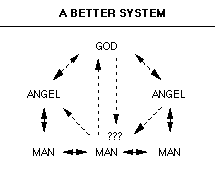
SMALL-GROUP TWO-WAY PRAYER
0. Agree. Identify in advance the person on whom you will all focus your caring, and the specific question you will raise on behalf of that person. Someone should write down the name and the question. It’s OK to prepare a list of people to pray for, but take only a few at any one meeting, and pray for them one at a time.
1. Stop. Meet in a quiet place, invite the presence of the Lord, sing a hymn–and then be silent for a few minutes while each tries to reduce your inner noise.
2. Open. Continue in silence for another minute while each tries to open your heart and mind. Think about your preconceptions and personal preferences–and set them aside–but do not open to receive discarnate messages at this point.
3. Elevate. Here, you can help each other. Each may share one brief example of something good or true or beautiful or holy–but do not discuss these examples now. Quietly sing together one of the great hymns: get into it and let it get into you.
4. Care. Someone mention the name of the person, and all focus their caring on that person. If you don’t know the person, focus caring on someone who does.
5. Pray. Someone read the question, and all ask the Lord that question inwardly.
6. Listen. Each must listen for the Lord’s reply in your own way. One minute is enough. Note whatever you received–or the fact you did not receive anything.
7. Test. Each share–and all discuss–what was received. Take plenty of time. Test each message and decide, as a group, what level of the spiritual spectrum it came from. Implement those messages that all agree must have come from God.
Thank You Ben
Education continued
5 For this very reason, make every effort to add to your faith goodness; and to goodness, knowledge; 6 and to knowledge, self-control; and to self-control, perseverance; and to perseverance, godliness; 7 and to godliness, mutual affection; and to mutual affection, love. 8 For if you possess these qualities in increasing measure, they will keep you from being ineffective and unproductive in your knowledge of our Lord Jesus Christ.
The question you might be asking is : How much education do I need to determine Gods will for my life? The answer is: variable. Consider the role of a surgeon who is trying to help the human condition in specific area’s of the body.
Much education is required and continued education after graduation to stay informed and a part of the medical community. Within the medical community there are various functions which require various amounts of education. For example: in “The Mayo Clinic” there are custodians who are charged with maintenance, cleanliness and order of the facility. There are also highly trained brain surgeons who perform miraculous surgery. In between many layers of Nurses, technicians, lab assistants, therapists and on and on.. All of these positions need filled with reliable people for the Clinic to operate in an effective healthy way toward the goal of helping mankind’s physical condition.
John 14:2 King James Version (KJV)
2 In my Father’s house are many mansions: if it were not so, I would have told you. I go to prepare a place for you.
The above passage has been interpreted many ways, please pray fully consider the following as a possible interpretation:
“Mansions”. Translates from a word that means dwelling places.
The thrust of the first few verses of John 14
2 In my Father’s house are many mansions: if it were not so, I would have told you. I go to prepare a place for you.
3 And if I go and prepare a place for you, I will come again, and receive you unto myself; that where I am, there ye may be also.
4 And whither I go ye know, and the way ye know.
is an assurance from Christ to His disciples that they would have a place with Him, that He would not abandon them.
No where does the Bible refer to heaven as “My Father’s house.”
However, Jesus called the temple “My Father’s house” in John 2:16. 16 And said unto them that sold doves, Take these things hence; make not my Father’s house an house of merchandise. “Mansions” translates from a word that means dwelling places. Built around the exterior wall of the temple were many chambers for the priests to use when counseling worshipers privately.
The people hearing Christ were familiar with the temple and therefore would have immediately associated His words in this passage with those chambers. Jesus told His disciples that He was going to prepare a “place” or position of service for them.
Where will Christ be when His disciples rejoin Him?
He will be on earth, thus fulfilling a prophecy given to the apostles by angels in Acts 1:11 11 Which also said, Ye men of Galilee, why stand ye gazing up into heaven? this same Jesus, which is taken up from you into heaven, shall so come in like manner as ye have seen him go into heaven.. His return also fulfills a multitude of prophecies of the Kingdom of God in the Old and New Testaments.
Beyond assuring the disciples that they would be with Him,
Christ also conveyed that He would give them important positions of authority in the coming Kingdom. Revelation 20:66 Blessed and holy is he that hath part in the first resurrection: on such the second death hath no power, but they shall be priests of God and of Christ, and shall reign with him a thousand years. Revelation 5:10 10 And hast made us unto our God kings and priests: and we shall reign on the earth. Confirm that this is every Christian’s potential.
In the spiritual arena,
It is somewhat similar. All Holy ones are not exactly like Jesus Christ, however, all strive to be more like Jesus Christ. Your Lord “Jesus” knows what education you need and he will lead you to it, if and when you have Learned to Listen.
Gods will for your life will be made clear when you have acquired the needed education. When you have been chosen to work for God, it will be clear to you and you will have no fear as you will have I (Ruach Ha’ Kodesh) inhabiting your space and mentoring you as required.
This site has a library to get you started. Much of the material is of no charge. Some books are available on Amazon and other vendors.
We also will show you a link to an Online Bible Institute with a large amount of spiritual education and you can even apply toward a degree.
Remember to use prayer to lead you to your education. And Listen. Have your selection of education in front of you and Listen for direction. If you feel you need help from a natural man, use a contact button. We can help pray with you.
Blessings on your studies:
